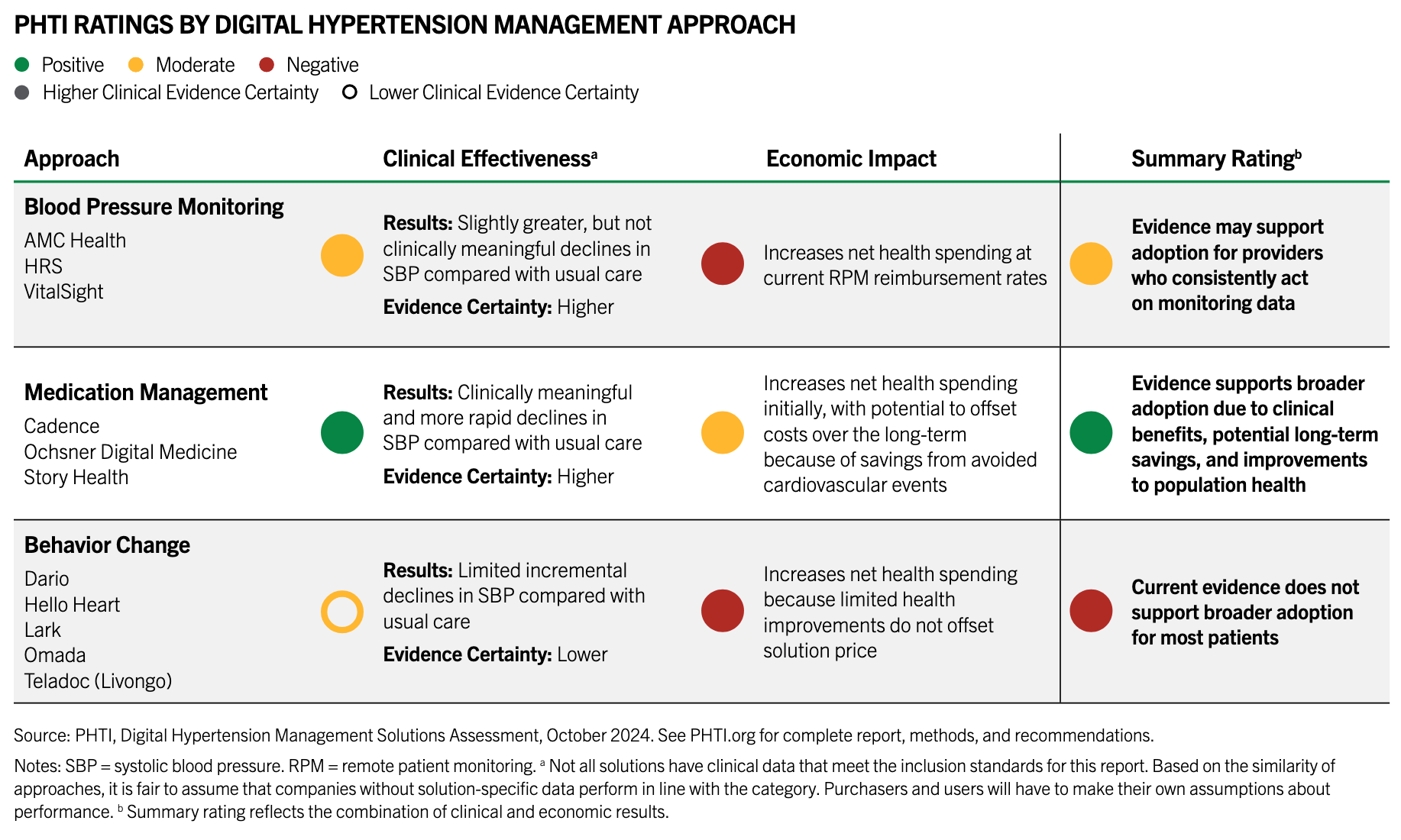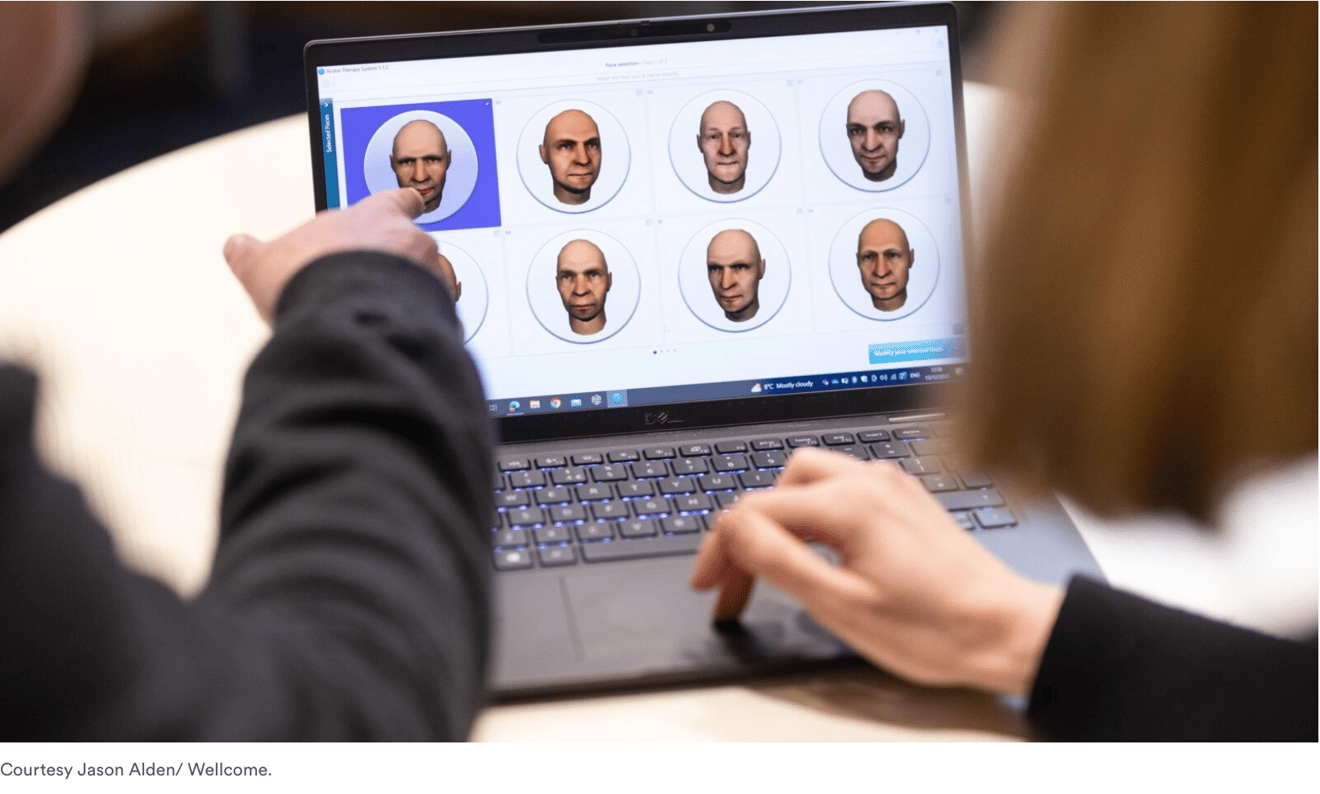adventures in benchmarking
Lukewarm outlook for hypertension technology
Digital health evaluation nonprofit the Peterson Health Technology Institute takes aim at the burgeoning market for hypertension treatment and management in its latest report, and it isn't all good news for the companies hawking digital blood pressure cuffs, remotely observing levels, managing patients' medication regimens, and using technology to nudge patients to change their habits such as diet or exercise.
The hypertension-focused tech companies appear to have coalesced around a handful of strategies: blood pressure monitoring, conducted by companies such as VitalSight; medication management by companies including Story Health; and behavior change, offered by well-known digital health darlings like Omada and Teladoc (via its multi-billion dollar acquisition Livongo).
Most of them, PHTI found, did not lead to clinically meaningful reductions in blood pressure: Only medication management companies currently demonstrate significant reductions. Remote monitoring showed "slightly greater, but not clinically meaningful declines" in blood pressure compared to the standard of care. And, behavior change technology leads to only "limited incremental
declines," authors noted in the chart below.

Some were less than impressed with the findings, including Omada, which has built a business around using technology to manage chronic conditions.
"We believe that the latest PHTI assessment inadequately groups companies with very different offerings, narrowly focuses on select clinical metrics (i.e. blood pressure), and presents virtual care providers as point solutions, which is inconsistent with buyer and member needs," chief medical officer Carolyn Bradner Jasik said. The company believes the American Medical Association's "Return on Health" framework for assessing the value of virtual care "provides a more holistic and relevant approach, and we encourage the digital health industry to join us in adopting it."
digital therapies
'Avatars' emerging as effective treatment for psychosis

In their latest report for STAT, my colleague Timmy Broderick highlights stunning new research exploring technology's ability to address auditory verbal hallucinations, a key symptom of psychosis. In a multicenter Phase 2/3 trial performed in the United Kingdom and published in Nature Medicine, researchers found that letting participants speak with animated heads and voices, designed to resemble the voices they heard internally, led to a decrease in their severity and frequency over 16 weeks.
"To our knowledge, this is the first therapeutic intervention that has a direct and sustained impact upon the frequency with which people hear voices," Philippa Garety, the study's lead author, said.
"When the thing on the screen says, 'you're a piece a shit, you're worthless, and you'll never amount to anything,' it's really affecting. It's really, really an emotional experience," Mark Huckvale, one of the creators of the digital avatar software, said. "You're trying to get people to build up their own self-esteem, and to do that they have to argue back against this persecution." Read more from Timmy.
the race for the white house
Black, Latino health tech leaders endorse Harris
Support for the vice president in the upcoming election is building among health tech leaders: Last month I wrote about a group of hundreds of womens' health leaders signing an open letter in support of Kamala Harris, despite the risk of losing customers or crucial backers. And, this month a few dozen Black and Latino health tech leaders have followed suit with their own letter, organizer and SameSky Health founder Abner Mason told STAT. Harris, the letter says, has a "vision for health equity [that] aligns closely with our own: a future where technology is harnessed to empower, not exclude."
"The upcoming election is about more than just politics — it's about who will lead us toward a future where health equity is a priority, and where technology is used to bridge gaps, not widen them," reads the letter, signed by prominent investors, entrepreneurs and policy leaders including Health Equity Ventures founding partner Michael Penn, Jerry Abraham, president of the Los Angeles County Medical Association, and Nzinga Harrison, co-founder and chief medical officer at Eleanor Health.
Among principles espoused in the letter: "Health technology should be designed for everyone, ensuring digital tools are intuitive, accessible, and usable by all, including those historically left behind." And "digital health solutions must be fair and transparent, safeguarding against biases that can exacerbate existing health disparities."
artificial intelligence
What NVIDIA's up to in health care
As its stock soars, the chip maker NVIDIA is expanding its health care and life sciences offerings, spanning from virtual AI agents for call centers to generative AI to make clinical documentation faster and more accurate.
In a keynote at HLTH — following NVIDIA's announcement on its collaboration with Aidoc on a guideline for integrating AI into clinical workflow — health care and life sciences vice president Kimberly Powell described a new age of "services as a software," and framed NVIDIA's technology's evolution from generative AI as a series of layers.
"It starts with the generative AI breakthrough that Open AI, and many others — now dozens and dozens of foundational model developers have had," she said last week. "They have this foundational layer in which you pre-train the model on the world's existing data. And so what it's fantastically good at is thinking fast. Essentially it's memorized everything...but it wasn't quite enough to be that breakthrough in health care applications that we needed," she said.
But more recently, companies like NVIDIA have been able to build on the foundational layer to "wrap" it in a new, intuitive interface like voice or chat that allows humans to interact with it, she said. And even closer to the cutting-edge, over the last few months, companies are starting to build out a "reasoning layer" to connect foundational models to other trusted data sources within health care like electronic medical records or policy guidelines, she said.
reading between the lines
Epic makes a show of welcoming Oracle to TEFCA
Electronic health record software purveyor Cerner's owner Oracle said this week it planned to apply to be a Qualified Health Information Network — an entity within the health data exchange framework known as the Trusted Exchange Framework and Common Agreement or TEFCA. And longtime rival and current QHIN Epic — facing criticism for allegedly blocking competition and opposing data flow — published a head-scratchingly passive-aggressive press release in response. "Interoperability is a team sport, and Epic looks forward to Oracle Health getting off the sidelines and joining the game," the release says. "Epic hopes that today's Oracle Health announcement indicates that they are finally ready to take interoperability seriously—and to deliver the technology that patients and providers deserve instead of making distracting, untrue statements."
In other health IT news, TEFCA steward and the Health and Human Services Department's acting chief AI officer Micky Tripathi said at the HLTH conference in Las Vegas that his office is close to hiring a chief technology officer, chief data officer and a permanent chief AI officer. "We are now just about to finalize the selections of those, and we anticipate having them in place before the end of this calendar year," he said. He did not say anything about who those people are or what their authorities will be. We'll be tracking this closely.
Also on health AI, I've noticed a proliferation of products and industry frameworks meant to monitor and evaluate digital health and health AI. The Digital Medicine Society, or DiMe, unveiled a new "seal" for digital health software products during HLTH, among others. How do startups hoping to break into the market know which governance technology to buy, which frameworks to build toward? (If you have thoughts, frustrations, solutions, drop me a line.)
Last week, I told you about the "responsible AI" platform co-developed by Microsoft, Duke, and the Microsoft-Accenture joint venture Avanade being marketed to health care organizations to monitor AI products; leaders of that effort told me that they're currently looking for health records vendors to pipe their own AI information into the platform. But the fact that it already doesn't deeply integrate with health records is a red flag, Andrew Hines, founder and chief technology officer at EHR and revenue cycle management company Canvas Medical, told me.
"The idea of an "AI Governance" product supporting registration of an algorithm and tracking its performance — but somehow, magically, without deep integration to the EMR — makes no sense," he said in an email. "It's not to say an unintegrated product has no value.... But anything that purports to measure effects needs a lot of in-EMR instrumentation to back it up."








No comments